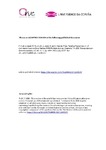Analog Transmission of Correlated Sources Over Fading SIMO Multiple Access Channels

Ver/
Use este enlace para citar
http://hdl.handle.net/2183/35669Coleccións
- Investigación (FIC) [1685]
Metadatos
Mostrar o rexistro completo do ítemTítulo
Analog Transmission of Correlated Sources Over Fading SIMO Multiple Access ChannelsData
2017-07Cita bibliográfica
P. Suárez-Casal, Ó. Fresnedo, L. Castedo and J. García-Frías, "Analog Transmission of Correlated Sources Over Fading SIMO Multiple Access Channels," in IEEE Transactions on Communications, vol. 65, no. 7, pp. 2999-3011, July 2017, doi: 10.1109/TCOMM.2017.2695197
Resumo
[Abstract]: Joint source-channel coding for discrete-time analog sources is an appealing transmission approach because of its extremely low delay and complexity. When the users access the channel orthogonally, analog transmission of correlated information over fading multiple access channels (MACs) using modulo-like mappings provides better performance than uncoded transmission. In this paper, we propose a simplified decoder for modulo mappings in possibly non-orthogonal MAC scenarios with a single-antenna users and a multiple-antenna receiver. Sphere decoding is investigated to reduce the computational complexity when the number of users is large. In addition, affordable strategies are proposed to optimize the mapping parameters according to the channel conditions and the source correlation. The obtained results show that the use of modulo mappings is suitable when the number of antennas at the receiver is larger than the number of users and for high correlation between user data.
Palabras chave
Multiuser channels
Correlation
MAP estimation
Mean square error methods
Correlation
MAP estimation
Mean square error methods
Descrición
© 2017 IEEE. This version of the article has been accepted for publication, after peer review. Personal use of this material is permitted. Permission from IEEE must be obtained for all other uses, in any current or future media, including reprinting/republishing this material for advertising or promotional purposes, creating new collective works, for resale or redistribution to servers or lists, or reuse of any copyrighted component of this work in other works. The Version of Record is available online at: https://doi.org/10.1109/TCOMM.2017.2695197.
Versión do editor
Dereitos
Todos os dereitos reservados. All rights reserved.
ISSN
0090-6778
1558-0857
1558-0857





